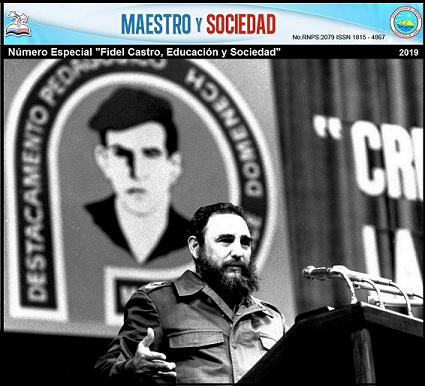The Fidel Castro thought in the formation of the electric family
Keywords:
training, professional training, interdisciplinaryAbstract
One of the current challenges of Technical and Vocational Education is to achieve a quality training process, which guarantees a comprehensive general culture in students. In this sense, the study and dissemination of the pedagogical thinking of Fidel Castro Ruz is vital, which is essential for the professional training of the mid-level technician of the Electric family and fundamentally everything related to the Technical Scientific development in the branch Electrical, with the purpose that they subsequently apply that knowledge acquired in their professional life, and thus become integral men for science, sensitivity and conscience. The objective of this work is to address the most essential aspects of Fidel Castro's pedagogical thinking and how it influences the professional training of students from an interdisciplinary approach. For the realization of the article, methods such as analysis and synthesis, the functional structural systemic, the interview and the observation were used, which allowed corroborating the relevance and timeliness of the study carried out.
References
2. Álvarez, P. C. (2008). Habla Fidel. 25 discursos en la Revolución. La Habana: Oficina de Publicaciones del Consejo de Estado, Cuba.
3. Barrabia, O. (s/a). Contribución de Fidel Castro a la transformación de la educación cubana en la etapa revolucionaria de 1959-1961. Folleto. La Habana. Cuba: I ISPEJV.
4. Barrabia O. (2006). Contribución de Fidel Castro a la concepción de la formación del hombre nuevo en la escuela cubana de 1959 a 1975. (Tesis de doctorado). Instituto Superior Pedagógico Enrique José Varona, La Habana, Cuba.
5. Blanco, K. (2003). Todo el tiempo de los cedros. Paisaje familiar de Fidel Castro Ruz. La Habana: Casa Editora Abril.
6. Blanco A. (2003). Filosofía de la educación. La Habana. Cuba: Pueblo y educación.
7. Borges T. (1985). Un grano de maíz. La Habana. Cuba: Oficina de Publicaciones del Consejo de Estado.
8. Castro, F. (1960). Discurso en Congreso de la Federación de Trabajadores del Azúcar el 27 de marzo de 1960. Hoy. Primera edición. Marzo, 29. p 2
9. Castro, F. (1981). La historia me absolverá. La Habana: Ciencias Sociales.
10. Castro, N. (1995). Aportes pedagógicos del Comandante en Jefe Fidel Castro Ruz a la pedagogía cubana. [CD-Rom].
11. Chacón, N. (2009). Pensamiento pedagógico de Fidel Castro. Educación ética y en valores. La Habana: Sello editor Educación Cubana. Ministerio de Educación.
12. Chávez, J. (2001). Bosquejo histórico de las ideas educativas en Cuba. La Habana: Pueblo y Educación.
13. Del Llano, M. (2003). Un nuevo reto del personal docente: la municipalización de la universidad pedagógica. [CD-Rom].
14. García G. (2003). Compendio de pedagogía. La Habana: Pueblo y Educación.
15. Quintana S., R. (s.f.). El ideario educativo de Fidel Castro en la formación de maestros. (s.p.e.).
Downloads
Published
How to Cite
Issue
Section
License
This journal provides immediate open access to its content, based on the principle that offering the public free access to research helps a greater global exchange of knowledge. Each author is responsible for the content of each of their articles.



























 Universidad de Oriente
Universidad de Oriente 